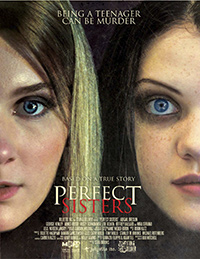Sister, My Sister: Brooks’ Uneven Debut Fumbles
 Producer Stanley M. Brooks makes his directorial debut with Perfect Sisters, one of those tawdry sounding stories about familial dysfunction concerning a pair of teenage sisters that decided to kill their mother in 2006. There’s something perversely shocking about matricide, even by today’s glib standards, and the cinema is rife with similar examples, particularly in exploitation efforts and/or other morose endeavors. Brooks’ film will most likely recall Peter Jackson’s exceptional debut, 1994’s Heavenly Creatures, itself taken from the true life account of a woman that would grow up into author Ann Perry. However, Brooks’ isn’t quite as adept as Jackson with this tonally awkward exercise that is particularly grating until its second half, when the film actually manages to balance a murder with chilling detail, speckled with dark humor an a surprising alacrity considering the groan worthy extravaganza that came before.
Producer Stanley M. Brooks makes his directorial debut with Perfect Sisters, one of those tawdry sounding stories about familial dysfunction concerning a pair of teenage sisters that decided to kill their mother in 2006. There’s something perversely shocking about matricide, even by today’s glib standards, and the cinema is rife with similar examples, particularly in exploitation efforts and/or other morose endeavors. Brooks’ film will most likely recall Peter Jackson’s exceptional debut, 1994’s Heavenly Creatures, itself taken from the true life account of a woman that would grow up into author Ann Perry. However, Brooks’ isn’t quite as adept as Jackson with this tonally awkward exercise that is particularly grating until its second half, when the film actually manages to balance a murder with chilling detail, speckled with dark humor an a surprising alacrity considering the groan worthy extravaganza that came before.
High school senior Sandra (Abigail Breslin) and her sister Beth (Georgie Henley) share an incredibly close bond as siblings, the kind generally associated with twins, having developed their own language. As we meet them about to changes addresses once again, mom Linda’s (Mira Sorvino) forced positivity belies considerable strain underneath it. A down and out nurse that’s generally between out of employment, Linda is an alcoholic, which accounts for the girls having to basically rear themselves, along with their little half-brother, about a decade younger. While they seem to lead a somewhat normal existence at school with Sandra courting the in-crowd and Beth preferring the alternative crew, they are painfully aware of their circumstances, knowing the ground beneath their feet could give way at any time. Linda’s new boyfriend (James Russo) enjoys the same enabling activities as their mother, but his occupation as a lawyer affords them a solid address, for the time being. But his hard drinking quickly escalates into his untoward fondling of Beth. And so, since Linda is clearly unable to take care of them and seems to shove them in harm’s way, the sisters plot to kill their mother, making her death look like an accident in order to live off the insurance money. They’re quite vocal about their intentions, incorporating a few school friends in their plans. But talking about murder and actually committing it are two very different things, as the young ladies soon find.
It seems readily apparent that screenwriters Fab Filippo and Adam Till may not be accustomed with the lingo of teenage girls, as several adolescent interactions here feel incredibly trite and forced. While Breslin and Henley are, for the most part, quite natural in their performances, the quality of filmmaking seems more akin to a made for television feature.
There are moments of surprising humor as we set off into this mire, the girls navigating around an often drunk (and quite sad) Sorvino, and by the time we get to the dirty deed, what transpires is quite uncomfortable and rather disturbing. The casting of Breslin and Henley, two notable child stars, should be a definite draw—but Perfect Sisters isn’t as good as it should be considering the quality of talent involved, as one instance where Sandra shout/bonds with popular girl Ashley at a party proves. Then there’s that blight of omniscient narration that unnecessarily opens the film, reiterated conveniently during the final third, a stagnant courtroom sequence featuring lazy reconstruction of the same old song and dance.
More amusingly, Brooks attempts to give us visual motifs of the girls’ strong bond based on their clasped hands, often gracing the screen with slo-mo of said appendages parting in order to provide even more emphasis. Every now and then, the film hits a definite note of ingenuity, but the deliberately quirky asides, which attempt to enliven the material, feel amateurish and false. There’s a way to make this film concerning today’s disassociated teenagers and their capacity for murder as a funny and disturbing glance at dysfunction, but it requires a sharper hand than the one at work here.
★★/☆☆☆☆☆


